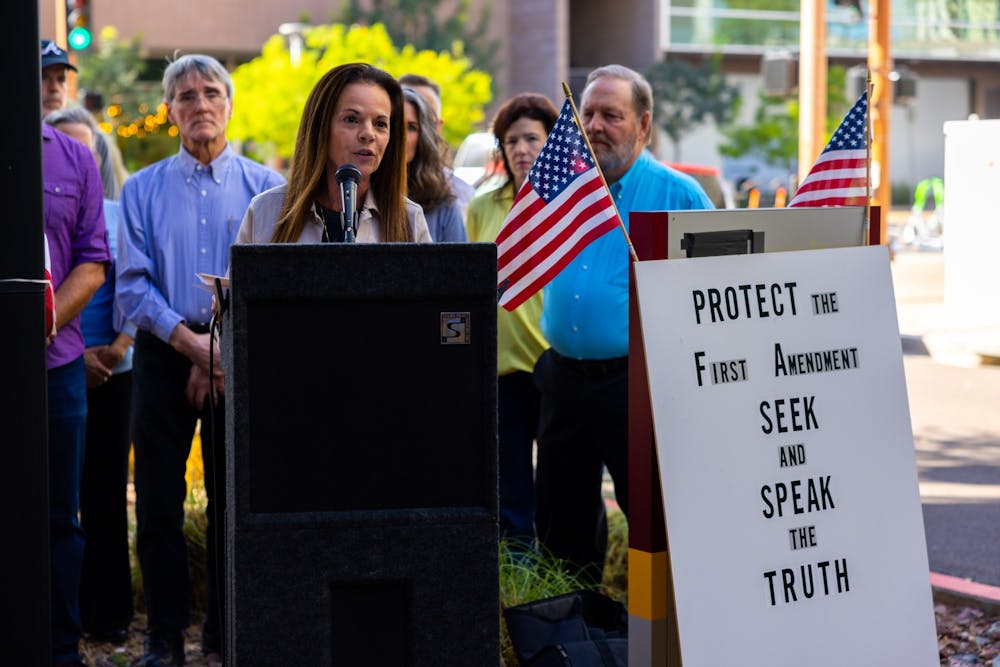Former journalists and media professionals spoke about escalating rhetoric by political candidates, such as Arizona Republican candidate for governor Kari Lake, attacking and misplacing blame on the media outside of ASU's Sandra Day O’Connor College of Law Wednesday.
A joint non-partisan statement signed by over 60 former members of the media "representing those who have worked in all corners of the state and in media entities across the United States" was read by Marlene Galán-Woods, a former broadcast journalist for KTSP and KPNX.
The gathering comes a week after Lake denounced Arizona PBS for giving Democratic rival Katie Hobbs an equal on-air time slot of 30 minutes despite Hobbs declining a debate.
READ MORE: Kari Lake's Arizona PBS interview canceled after station scheduled Katie Hobbs interview
"Journalists are not perfect. We make mistakes. And, of course, questioning the press, challenging it, is part of what we do in a free Republic. But bullying reporters for political gain is unacceptable and unpatriotic. This is not a partisan belief. In fact, the signers of this document never shared their political leanings — only that this dangerous strategy as a way to gain power and control of the levers of government should be rejected," Galán-Woods read from the statement.
Lake, who worked as an anchor for FOX 10 for 22 years, has made her opposition to journalists part of her campaign, even tweeting that lying journalists should be punished.
"For Kari Lake to use her expertise and experience as a television news reader to undermine the profession of journalism and her former colleagues is reprehensible," Woods-Galán said. "The only possible motive must be an unquenchable desire for power."
Among those who signed the statement were five former journalists who also worked for KSAZ-TV. The reading of the statement was followed by speeches from Cary Pfeffer, Civia Tamarkin, Bill Andres and Camille Kimball.
Tamarkin, who previously worked for CNN, ABC and Time Inc. Magazines echoed the statement, saying freedom of the press is vital to democracy.
"We are diggers and gatherers of facts — and then when we tell the public what those facts are, regardless of what that outcome may be, it is the truth," Tamarkin said. "And now we are seeing the terrifying distortion of the facts and the truth in a way that absolutely threatens our democracy."
She further emphasized this by stating the role of journalists is "to sound these alarms" when democracy is at risk.
"I certainly hope, as all my colleagues do, that everybody will heed this warning and realize that this democracy–this experiment in democracy–is extremely fragile here at home in Arizona and across the country," Tamarkin said.
In her speech last Wednesday, Lake said it is "the taxpayers who own PBS." Andres, who worked at 12 News, contested the point that anyone who puts money into a news outlet should be in charge of what is posted.
"Journalism's job is not to report two sides — it's to find the truth," Andres said. "It is the journalist's job not to please or placate the advertisers, nor to gain return on investment for shareholders. It's the journalist's job to determine the truth and report it."
Edited by Piper Hansen, Wyatt Myskow and Kristen Apolline Castillo.
Reach the reporter at caera@asu.edu and follow @CaeraLearmonth on Twitter.
Like The State Press on Facebook and follow @statepress on Twitter.

Caera Learmonth is a full-time reporter for the Community and Culture desk. She was previously the Executive Editor of her high school newspaper and has taken journalism programs at the School of the New York Times and University of Southern California.




